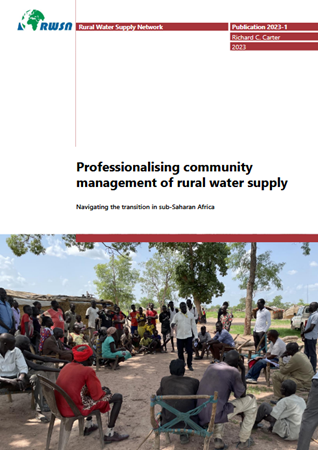Professionalising community management of rural water supply - Navigating the transition in sub-Saharan Africa
 |
Professionnalisation de la gestion communautaire de l'approvisionnement en eau en milieu rural - Piloter la transition en Afrique subsaharienne
Jan 2023 ; 11 pages
Ed. RWSN - Saint Gallen
Téléchargeable sous format: PdF
Site internet: https://rural-water-supply.net/fr/ressources/1103-professionalising-community-management-of-rural-water-supply
Abstract:
There is a strong drive among many rural water professionals to move away from community management (which is deemed to have failed) to ‘professionalised’ service provision by private enterprises or public utilities. I estimate that a few tens of millions of rural people in sub-Saharan Africa (the geographical focus of the paper) currently have a service provided by a ‘professional’ entity in this sense; and that a similar number may enjoy a community managed arrangement in the true sense (i.e. in which the community’s skills have been brought to an appropriate level for their various tasks, and in which there is a formal arrangement for external support). This may leave about 500 million rural people whose water service is effectively unmanaged. I argue that the apparent failure of community management is a problem of implementation, not so much the model itself as origi- nally envisaged. This failure is largely that of implementers neglecting to ensure the existence of adequate community capacity and exter- nal support. The transition to professional management arrangements will take time. Systems which are currently effectively unmanaged should in- creasingly be supported by local governments and their develop- ment partners. At the same time more experimentation with service provision by private enterprises and public utilities should be encour- aged, and the learning from such transition experiments be properly documented. I conclude with five principles for the transition, urging (a) realistic time scales, (b) genuine public participation, (c) experimentation and learning, (d) a recognition of the unpredictability of the change pro- cess, and (e) openness to a plurality of outcomes.
Mot clef: |
Editeur/Diffuseur: |
|
RWSN
-
Rural Water Supply Network - Saint Gallen - Suisse |
En cas de lien brisé, nous le mentionner à communication@pseau.org